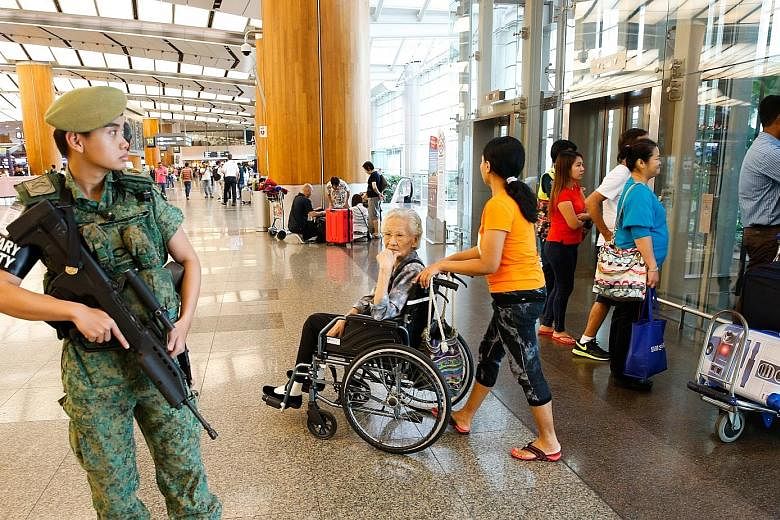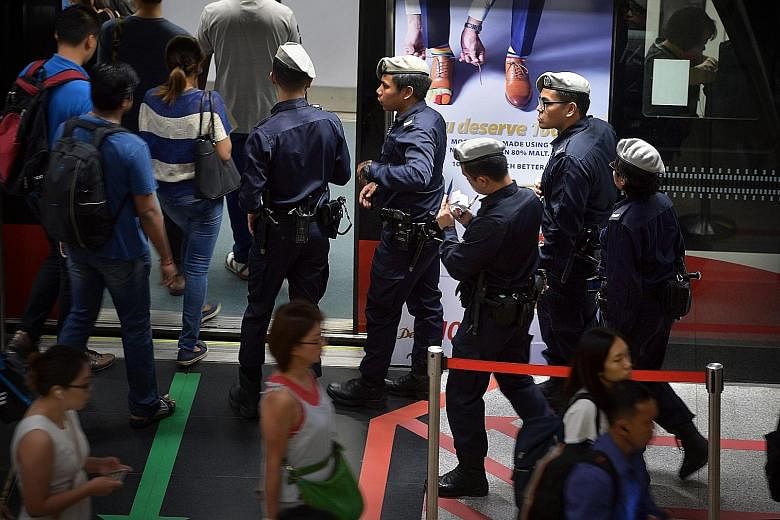Stricter checks at MRT stations may soon become part of everyday life in the face of increasing terror threats. Security experts say Singaporeans should ready themselves for inconveniences such as bag checks and screenings at key installations, especially transport hubs.
Associate professor Bilveer Singh of the National University of Singapore said terror attacks over recent years at metro or train stations in London, Madrid and Brussels show that these have become a target of choice. "We have to make these installations tougher to crack. Security checks will create inconvenience, but there is no choice, and people will have to understand this," Dr Singh said.
While there are already security checks at MRT stations, these are random and sporadic. Since the Brussels attacks, The Sunday Times understands patrols have been stepped up at key installations such as transport nodes, and security enhanced at checkpoints.
Experts said attacks on other "soft targets" such as shopping malls, schools and hawker centres are also worrying because these are "impossible to fully protect".
Mr Toby Koh, managing director of Ademco Security Group, suggested that random checkpoints be set up as a "visual deterrence".
This could mean circulating security checkpoints around the different MRT stations or transport hubs at random.
"It would remind citizens that security is important and to keep it in mind," he said, adding that complacency was Singapore's greatest weakness.
"We are a victim of our good policing, we always think this is not going to happen to us."
He added that commercial building owners could do more, noting that less than 10 per cent of such buildings were designed with security considerations in mind. Law and Home Affairs Minister K. Shanmugam flagged this concern on March 18, and revealed that the government would be asking developers of large projects to factor in security considerations at the design stage. Building owners could also be asked to install CCTV cameras.
Mr Paul Lim, chief executive of Secura Group, said buildings could be designed such that CCTV cameras could reach larger areas, and have fewer chokepoints to reduce the risk of stampedes in the event of an attack.
"How buildings are designed can also mitigate the after-effects of a terror attack, for example, if you have shatter-proof glass or pillars that withstand certain levels of explosive. In buildings that are badly designed, the damage can be 10 to 100 times greater," said Mr Lim.
Security studies academic Antonio Rappa from SIM University said more stringent checks should also be carried out on foreigners after they enter the country.
He pointed out that in the 1920s and 1930s, Japanese tourists who travelled to Malaya would take pictures of beaches, installations and utility pipelines. These later became part of an intelligence trove when the Japanese invaded.
In calling for vigilance, Dr Rappa said: "The security situation in Singapore is under control but the fact that arrests have been made recently, and more arrests are likely to occur, in my view, show the number of supporters for overseas terror networks is growing."
Tampines GRC MP Desmond Choo, who is on the Government Parliamentary Committee for Home Affairs and Law, said much of the "counter-terrorism work is done behind the scenes for obvious operational secrecy reasons".
"Singaporeans can be assured that the HomeTeam and security agencies are silently protecting our homeland," he said.



